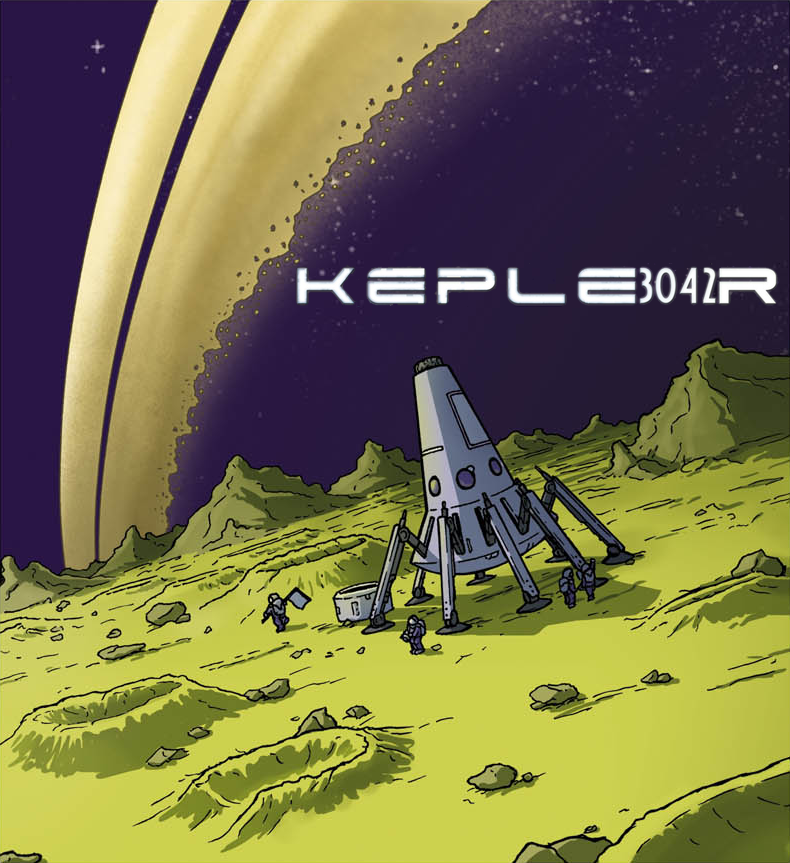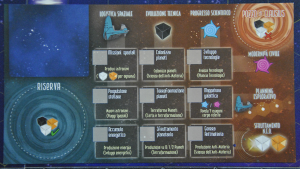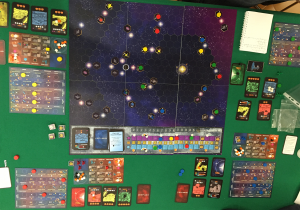
Today we are featuring a prototype that was kindly offered us to try by Placentia Games, Kepler-3042, whose crowdfunding campaign is available on Kickstarter.
The name of the game is inspired by the real Kepler probe sent by NASA into the space to search for new planets to colonize, the same purpose that each player will have in the game. In fact we impersonate a scientific company that, in the year 3042, will send spaceships into the space searching for new planets to colonize and to use to produce new resources.
THE GAME
The game is composed of 16 rounds. During each round, the players will have a primary action and two optional bonus actions. At the beginning of each turn an event card is revealed, whose effect will be applied at the end of that round. The effects of these events cards will apply to all the players who meet the specified requirements.
Each player will have:
- A dashboard where the main actions and optional bonus actions, according to a matrix, are indicated;
- A technological progress plank on which represents the technologies and the level of each one;
- 7 energy resources;
- 7 resources matters;
- 3 anti-material resources;
- 3 spaceships;
- 1 Earth card.
The main actions available will enable us to place new ships in the galaxy by paying the related cost in resources, move the ships, reveal planet cards, develop technologies, create antimatter, colonize planets, produce resources on the planets, or terraform a planet in our possession.
In order to use the optional bonus actions we will have to “burn” a resource among those on our reserves, then we must be careful not to use them too often otherwise we will end up with no resources to produce. In fact, the burnt resources are considered lost, as it will be very difficult to recover them. Secondary actions will allow us to place a ship in the galaxy (without paying its cost), generating an antimatter cube, advance one space on the colonial or technological leadership track, move the spaceships of two boxes or produce matter and energy on land.
At the end of the 16th round, the final score is calculated as follows:
- 1 point for each Antimatter Resource present on their cards Planet
- 3 points if they have at least 3 planets of the same type
- 5 points if they have one planet for each of the 5 types
- 2 points for each ship on a Mine hexagon
- 2 points for each technology to the maximum level
- 1 point for each Leadership Vexillum
- Possessed planets:
- 1 point for each planet you have in the Local Star Group area
- 2 points for each planet you have in Medium Range area
- 3 points for each planet you have in the Far Range area
- The scores given by the level of their Country indicator on each of the two Leadership tracks (shown in the middle with a yellow background)
- The points awarded from their Terraformed Planets (Victory Point marks below)
- The points assigned by the Country Objective
IMPRESSIONS
JoBel
The first thing that definitely catches the eye are the graphics and the description of the game environment, which is particularly felt, considering that Kepler-3042 is a resource management game.
The materials, even if in a pre-release version, are exceptional and suitable for the purpose of representing the space to explore and colonize.
The mechanical, although not particularly innovative, with the exception of “burn” resources to fulfill the powerful secondary action, are well oiled, fluid and settled in.
All this is topped off with a good replay value and durability with an average duration of 60-90 minutes per game.
However, we point out, to those who believe they can attack opponents with their own spaceships, that this action is absent. The interaction are quite low and merely advances the colonization of a planet, which otherwise hands the opponents a good deal ofpoints. This feeling is more pronounced with a low number of players, but it is still guaranteed good scalability.
Svik
This game caught my attention from the very first pictures I saw on the web and I’m happy to have the opportunity to test the preview.
The resource management system is very interesting and every player should carefully consider the choice to “burn” the material, otherwise you run the risk of not being able to produce them, or risk a slow start in the first rounds.
There is an element of randomness in the game that could influence the players choices but the strategy that everyone chooses to follow is much more important, given the limited number of actions available at each turn.
Kepler-3042 is well-balanced, and unless you’re quite distracted or in one of those nights where it was better to watch a movie due to the strike of the two neurons in your mind, at the outcome of the match is determined by a small difference of points between the players.
Ultimately, our advice is tograb the game and get involved, especially if your German Resource Management soul prevails over the exploration and conquest of space.
Find the campaign at the following link
https://www.kickstarter.com/projects/postscriptum-games/kepler-3042
| SCHEDA GIOCO | ||||||||||||||||||||||||||||||
|---|---|---|---|---|---|---|---|---|---|---|---|---|---|---|---|---|---|---|---|---|---|---|---|---|---|---|---|---|---|---|
| ||||||||||||||||||||||||||||||
| Fonte dati BoardGameGeek |




/pic8303117.png)





[…] [NanoAnteprima] Kepler-3042 (English version) […]